vespertilionize
v. to turn into a bat
Papered Over
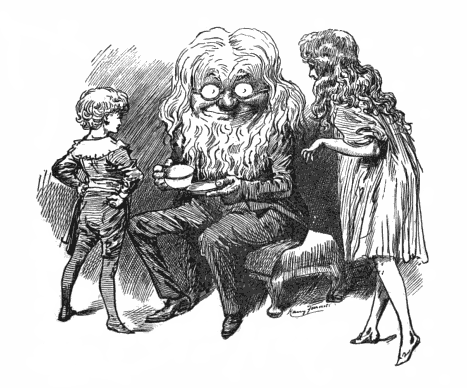
‘That’s another thing we’ve learned from your Nation,’ said Mein Herr, ‘map-making. But we’ve carried it much further than you. What do you consider the largest map that would be really useful?’
‘About six inches to the mile.’
‘Only six inches!‘ exclaimed Mein Herr. ‘We very soon got to six yards to the mile. Then we tried a hundred yards to the mile. And then came the grandest idea of all! We actually made a map of the country, on the scale of a mile to the mile!‘
‘Have you used it much?’ I enquired.
‘It has never been spread out, yet,’ said Mein Herr: ‘the farmers objected: they said it would cover the whole country, and shut out the sunlight! So we now use the country itself, as its own map, and I assure you it does nearly as well.’
— Lewis Carroll, Sylvie and Bruno, 1889
The Treachery of Images
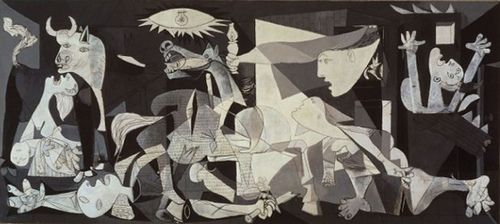
Picasso’s Guernica depicts the suffering wrought by a German bombing in 1937 during the Spanish Civil War.
Three years later, when the artist was living in Nazi-occupied Paris, a Gestapo officer saw a photo of the painting in his apartment. “Did you do that?” he asked.
“No,” Picasso said. “You did.”
Precocious
Thomas Macaulay was a child prodigy — and, one imagines, a trial to his parents:
- On seeing a chimney as a toddler, he asked his father, “Is that hell?”
- At 3 his mother told him he must learn to study without his bread and butter. He said, “Yes, mama, industry shall be my bread and attention my butter.”
- When he was 4 years old a servant spilled hot coffee on his legs; when the hostess inquired how he was feeling, he said, “Thank you, madam, the agony is abated.”
- When a housemaid threw away some oyster shells he’d been using to fence a garden plot, he marched into the drawing room and said, “Cursed be Sally, for it is written, ‘Cursed be he that removeth his neighbor’s landmark.'”
Reputedly his great gifts stayed with him throughout his life: As an old man he recited two poems he hadn’t seen since age 13.
Diaper With Holsters
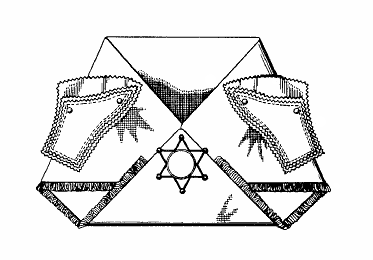
Patented by Harriet Clough in 1958.
Ogden Nash wrote, “Progress might have been all right once, but it’s gone on too long.”
A Mysterious Windfall
A riddle by Isaac Newton:
Four people sat down at a table to play;
They play’d all that night, and some part of next day;
This one thing observ’d, that when all were seated,
Nobody play’d with them, and nobody betted;
Yet, when they got up, each was winner a guinea;
Who tells me this riddle I’m sure is no ninny.
Who are the players?
Benardete’s Book Paradox
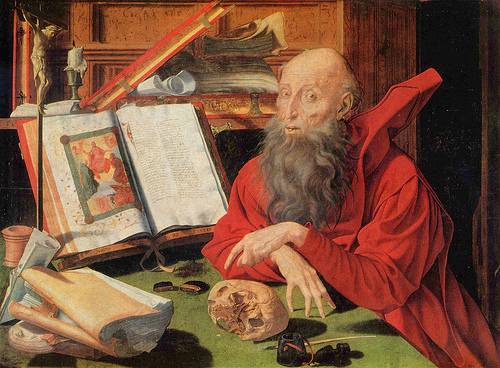
Here is a book lying on a table. Open it. Look at the first page. Measure its thickness. It is very thick indeed for a single sheet of paper — one half inch thick. Now turn to the second page of the book. How thick is this second sheet of paper? One fourth inch thick. And the third page of the book, how thick is this third sheet of paper? One eighth inch thick, etc. ad infinitum. We are to posit not only that each page of the book is followed by an immediate successor the thickness of which is one half that of the immediately preceding page but also (and this is not unimportant) that each page is separated from page 1 by a finite number of pages. These two conditions are logically compatible: there is no certifiable contradiction in their joint assertion. But they mutually entail that there is no last page in the book. Close the book. Turn it over so that the front cover of the book is now lying face down upon the table. Now, slowly lift the back cover of the book with the aim of exposing to view the stack of pages lying beneath it. There is nothing to see. For there is no last page in the book to meet our gaze.
— Patrick Hughes and George Brecht, Vicious Circles and Infinity, 1978
The Answer Wheel
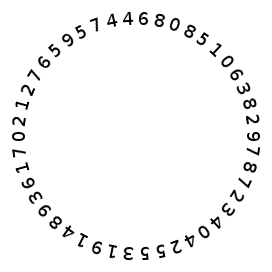
Multiply 212765957446808510638297872340425531914893617 by any number from 2 to 46 and you’ll find the product on the ring above.
Einstein wrote, “Pure mathematics is, in its way, the poetry of logical ideas.”
Unquote
“It takes a wise man to recognize a wise man.” — Xenophanes
You Are What You Eat
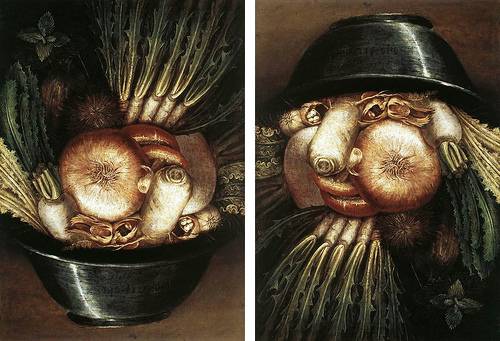
This 1590 painting by Giuseppe Arcimboldo is both a still life and a portrait — when it’s inverted, the bowl of vegetables becomes the greengrocer who sold it.
